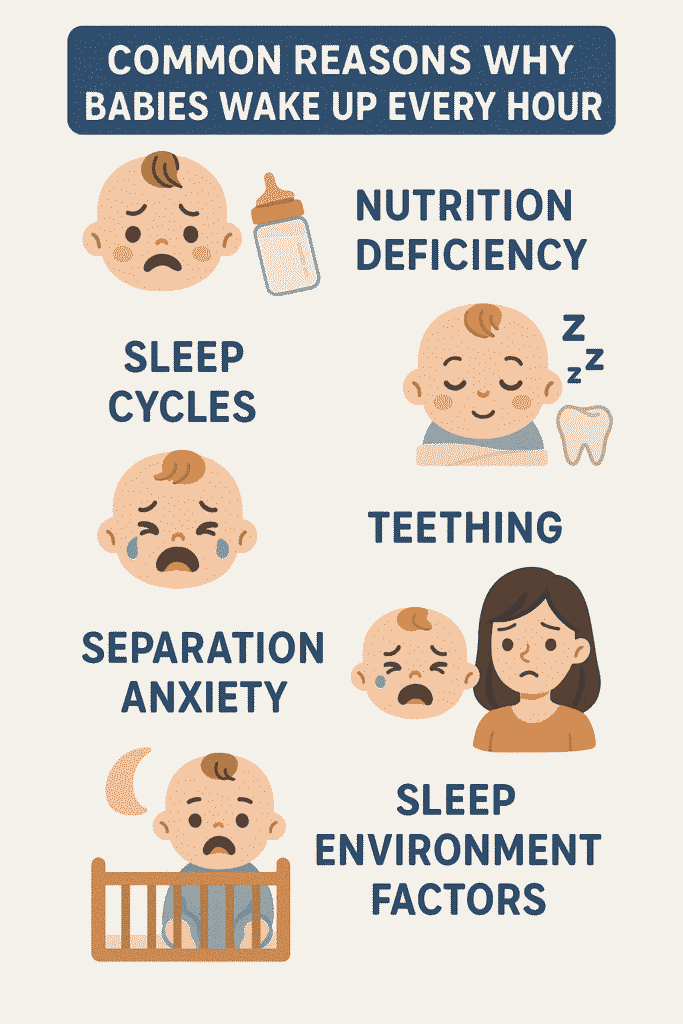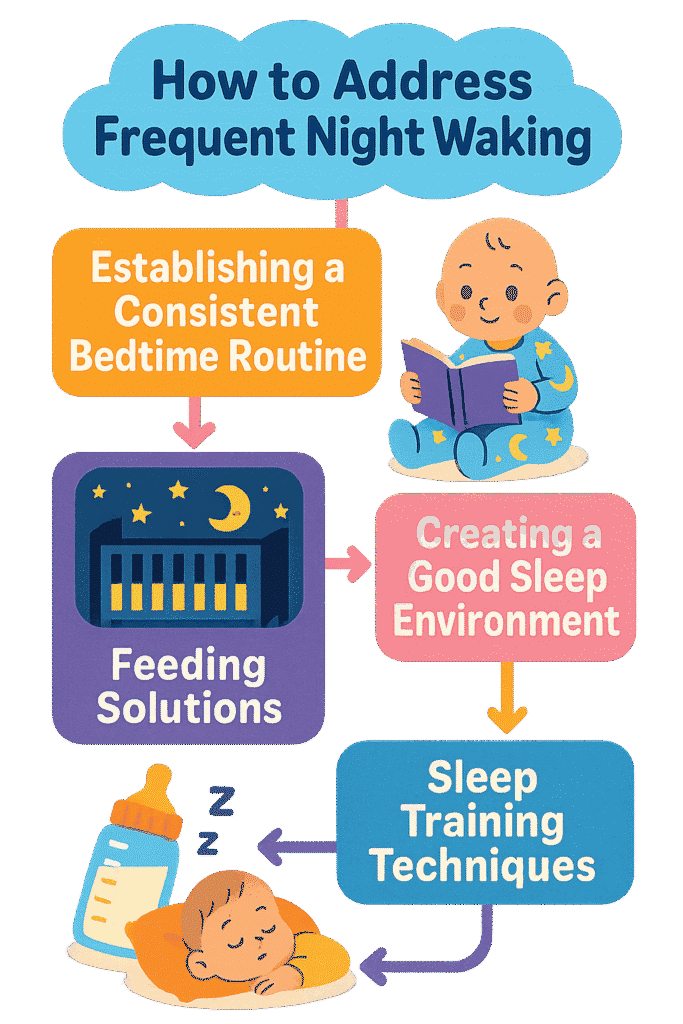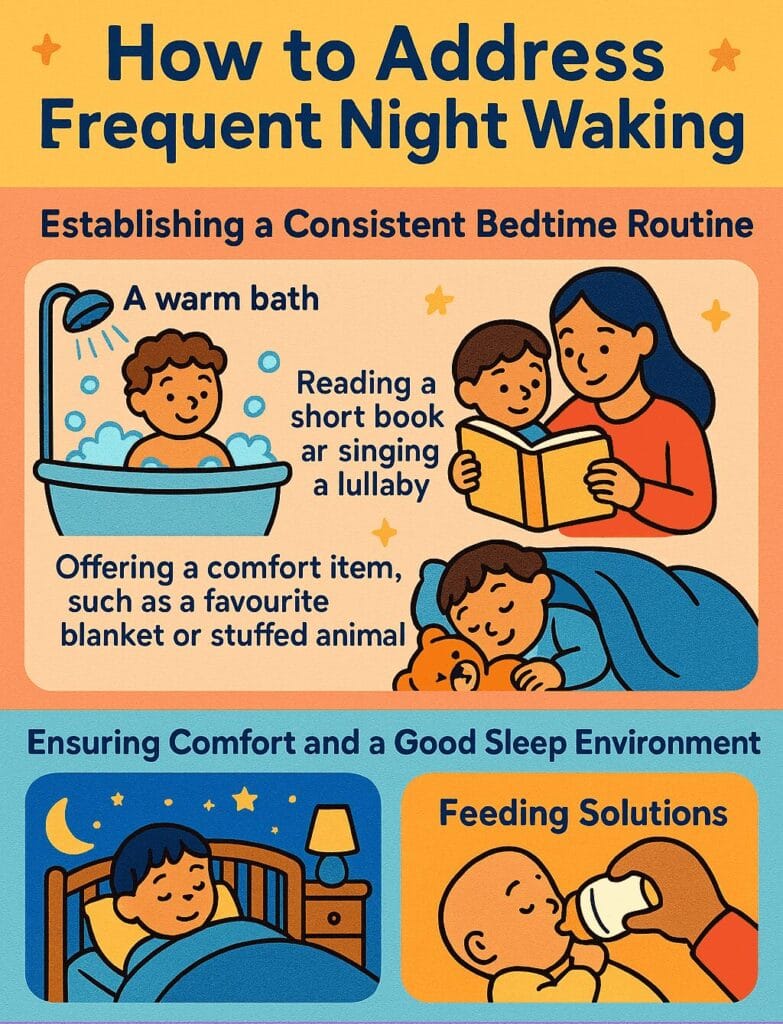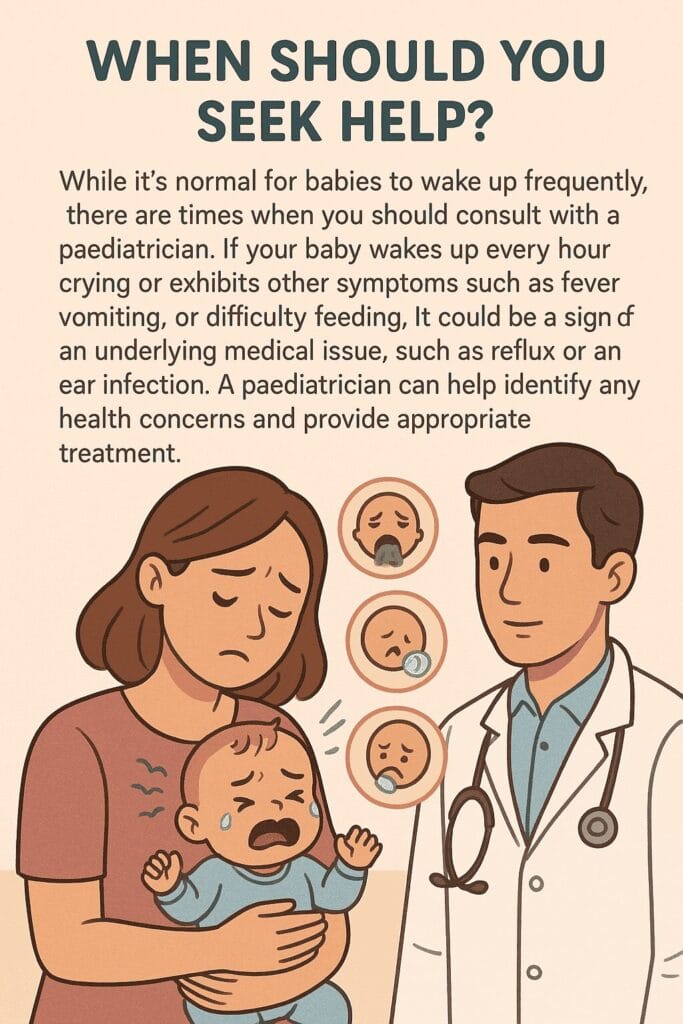Are you struggling with a baby that wakes up every hour? Discover seven powerful reasons why your baby wakes up every hour and practical solutions to help them sleep better through the night.
Why Does My Baby Wake Up Every Hour?
If you’ve found yourself waking up regularly to tend to your baby, you’re certainly not alone. Many parents wonder, “Why does my baby wake up every hour?” It’s common for babies to wake up frequently throughout the night, and understanding why it happens can help you feel more in control. Whether your baby wakes up every hour after 3 a.m. or your baby wakes up every hour at night, these wake-ups can lead to sleep deprivation and frustration.
However, rest assured that frequent night-waking is typically a temporary phase in a baby’s development. This article will examine why babies wake up so often, what you can do about it, and how to improve your baby’s sleep. Addressing the underlying causes can help your baby (and yourself) get more rest.
Table of Contents
Understanding Baby Sleep Patterns
To understand why babies wake up every hour, it’s essential to know that babies’ sleep cycles are much shorter than those of adults. Newborns and young infants typically have 50-60 minutes of sleep, compared to adults, whose sleep cycles last about 90 minutes. This means babies naturally wake up more often as they transition between sleep cycles, especially at night.
In the early months, babies sleep in a lighter stage of sleep more frequently, which is why they may wake up every hour. As your baby grows older, their sleep cycles lengthen, and they begin to enter deeper stages of sleep, eventually sleeping for more extended periods. By about 4 to 6 months, babies generally start to consolidate their sleep and begin to sleep for longer stretches at night. However, during the first few months, it is normal for a baby to wake up every hour as they adjusts to these changes.
If your baby wakes up every 2 hours or every hour at night, it’s likely part of this developmental process. These wake-ups will naturally decrease as your baby matures.
Common Reasons Why Babies Wake Up Every Hour

Nutrition Deficiency
One of the main reasons babies wake up every hour is hunger. Babies, especially in the first few months, have small stomachs and must feed frequently to meet their nutritional needs. If your baby wakes up every hour in the early stages, it could be because they are still hungry and need nourishment.
If you are breastfeeding, ensure your baby is effectively latching and feeding. Some babies may not get enough milk if they have difficulty latching or need more frequent feeding. If you are bottle feeding, you might need to adjust the amount of milk or formula to meet your baby’s needs.
A growth spurt can also increase your baby’s hunger, making them wake up more often to feed. Nutrition deficiency during the day can also cause babies to wake up more at night, so it’s essential to ensure your baby is feeding adequately during the daytime hours. Consider introducing a dream feed just before you go to bed. This feed can help keep your baby full for a longer stretch during the night and may reduce the number of night-wakings.
Sleep Cycles
Babies’ sleep cycles are different from those of adults. A baby’s sleep cycle typically lasts around 50 minutes, while an adult’s lasts 90 minutes. As a result, the baby wakes up every hour or more frequently. Babies who wake up after completing a sleep cycle may cry out or need help transitioning back to sleep.
Babies can’t self-soothe at this stage and may require a parent’s assistance to return to sleep. This is especially common for younger babies (around 2 months old) still learning to fall asleep independently. If your baby wakes up every hour at night, it is likely that they are moving between sleep cycles and need help returning to a deep sleep.
As babies grow, their sleep cycles gradually lengthen, and they will eventually learn to sleep through the night. However, frequent waking is a regular part of their sleep development during the first few months.
Teething
Teething is another reason a baby wakes up every hour. When babies begin teething, the discomfort can cause them to wake up crying throughout the night. Teething pain can be intense, especially in the early stages when the first few teeth are emerging.
If your baby wakes up every hour crying, it could be due to teething pain. Signs of teething include drooling, chewing on objects, irritability, and disrupted sleep. You may notice that your baby wakes up crying more often around 3 a.m., a typical time for teething discomfort to intensify. You can use teething rings, massage your baby’s gums, or offer teething gels safe for infants to relieve teething pain.
Separation Anxiety
Around the age of 6 to 9 months, babies start to experience separation anxiety. During this stage, babies develop a strong attachment to their caregivers and may feel distressed when they wake up and find themselves alone. If your baby wakes up every hour crying, they may be experiencing separation anxiety.
Separation anxiety often leads to more frequent night-wakings. Your baby may wake up crying for comfort, seeking reassurance from you. To help ease separation anxiety, you can create a consistent bedtime routine, offering comfort and security as part of your sleep ritual. A comforting item like a favourite blanket or sleep sack may help your baby feel more secure during the night.
Sleep Environment Factors
A baby waking up every hour could also result from environmental factors such as temperature, noise, or light. Babies are susceptible to their surroundings, and a room that is too hot or too cold can cause them to wake up. Similarly, loud noises, bright lights, or other disruptions in the sleep environment can cause frequent wake-ups.
To improve your baby’s sleep environment, keep the room at a comfortable temperature (between 68-72°F or 20-22°C) and reduce light exposure using blackout curtains. A white noise machine or fan can help block out any disruptive sounds. Ensure your baby’s crib is comfortable with a firm mattress and that their sleepwear is appropriate for the temperature.
Curious about why newborns smile in their sleep? It’s a common, reflexive behavior linked to their developing nervous system. These spontaneous smiles are often triggered by simple reflexes rather than dreams, making them a natural part of early infancy. To learn more about this adorable phenomenon and what it means for your baby’s development, check out our full article on why newborns smile in their sleep.
How to Address Frequent Night Waking

Establishing a Consistent Bedtime Routine
A consistent bedtime routine helps signal to your baby that it’s time to wind down for sleep. By offering a calming routine, you reassure your baby that sleep is coming. A consistent routine can include activities such as:
- A warm bath
- Reading a short book or singing a lullaby
- Offering a comfort item, such as a favourite blanket or stuffed animal
The predictability of a bedtime routine helps your baby feel more secure and ready to sleep. This is particularly helpful if your baby wakes up every hour due to separation anxiety.
Ensuring Comfort and a Good Sleep Environment
Your baby’s sleep environment dramatically affects how well they sleeps. If your baby wakes up every hour due to discomfort, ensure the room is quiet, dark, and comfortable. A firm crib mattress and soft, breathable sleepwear can help create a cozy sleep environment. Use a sleep sack for added warmth and security.
Feeding Solutions
If hunger is the cause of your baby waking up every hour, consider adjusting their feeding schedule. If your baby is still young, try a dream feed before bed to ensure they are full throughout the night. As your baby ages, try introducing solid foods to help curb hunger during the night. Increasing the food consumed during the day can help reduce nighttime awakenings.

Sleep Training Techniques
Sleep training helps babies learn to self-soothe and fall asleep independently. If your baby wakes up every hour, sleep training might be helpful. There are various sleep training methods, such as the Ferber Method, which involves letting your baby cry for progressively more extended periods before comforting them, or the No Tears Method, which focuses on relaxing your baby without letting them cry.
Managing Parental Fatigue
Sleep deprivation is one of the most challenging aspects of having a newborn. When your baby wakes up every hour, it can quickly become overwhelming, leaving you feeling exhausted and emotionally drained. The constant interruptions disrupt not only your sleep cycle but also your ability to function effectively during the day. To manage fatigue when your baby wakes up every hour, it’s essential to prioritize self-care and seek ways to improve your overall rest. Although it’s easier said than done, adopting strategies to cope with this fatigue will help you regain some energy, so you can take care of your little one and yourself.
Napping During the Day When Possible
One of the best ways to manage fatigue when your baby wakes up every hour at night is to take naps during the day. While it may seem impossible to rest with a newborn, stealing moments of sleep during the day can help recharge your body. Even short naps of 15-20 minutes can provide you with a burst of energy. If your baby naps during the day, try to use that time to rest as well. Taking care of your own sleep needs when your baby wakes up every hour at night will help you feel more refreshed and better equipped to handle the challenges of parenthood.
Asking a Partner or Family Member for Help During the Night
When your baby wakes up every hour, it’s vital not to bear the burden of sleepless nights alone. Asking your partner or a family member for help can make a world of difference. Divide the night shifts so that one person can get some solid rest while the other tends to the baby. This will allow you to catch up on much-needed sleep, even if it’s only for a few hours at a time. Managing parental fatigue is easier when you share the responsibility, especially when your baby wakes up every hour. Don’t hesitate to lean on others for support during this exhausting time.
Using a Co-Sleeping Arrangement If It Works for Your Family
If you’re comfortable with it, co-sleeping can be an effective strategy when your baby wakes up every hour during the night. Co-sleeping allows you to keep your baby close, making nighttime feedings and soothing much easier. Not only will this arrangement reduce the time spent getting in and out of bed, but it will also offer you a greater sense of comfort knowing that your baby is nearby. Many parents find that co-sleeping helps them get more rest, even if their baby wakes up every hour. However, it’s important to ensure that you follow safe co-sleeping practices to reduce any risks.
Taking Care of Yourself Is Just as Important as Caring for Your Baby
While it may seem like all of your energy should be focused on your newborn, it’s crucial to remember that taking care of yourself is just as important as caring for your baby. If your baby wakes up every hour, it’s easy to neglect your own well-being in favor of focusing entirely on the baby. However, getting some rest and looking after your health will allow you to be the best parent you can be. Taking breaks, hydrating, eating nutritious meals, and allowing yourself moments to relax are key to managing fatigue effectively. When you prioritize your own self-care, you’ll have the strength to cope better with the challenges of sleep deprivation when your baby wakes up every hour.
In conclusion, managing parental fatigue when your baby wakes up every hour requires a combination of rest, help from others, and self-care strategies. By finding a routine that works for your family and ensuring that you get the rest you need, you can cope with the challenges of sleepless nights and stay energized for the journey of parenthood.
When Should You Seek Help?

While it’s normal for babies to wake up frequently, there are times when you should consult with a paediatrician. If your baby wakes up every hour crying or exhibits other symptoms such as fever, vomiting, or difficulty feeding, it could be a sign of an underlying medical issue, such as reflux or an ear infection. A paediatrician can help identify any health concerns and provide appropriate treatment.
Frequently Asked Questions (FAQs)
1. Why does my baby wake up every hour?
It’s very common for babies to wake up every hour, especially in the first few months of life. Babies’ sleep cycles are much shorter than adults’, and they often wake up during the transitions between these cycles. Other factors like hunger, teething, separation anxiety, or environmental factors like noise and temperature can contribute to frequent wake-ups. If your baby wakes up every hour, it’s typically a normal developmental phase.
2. How can I help my baby sleep longer at night?
To help your baby sleep longer, try creating a calming bedtime routine, ensuring optimal sleep (quiet, dark, and comfortable), and feeding your baby well during the day. Some parents find that sleep training methods, such as the Ferber Method or a gentler approach, like the No Tears Method, can help babies learn to self-soothe and sleep longer.
3. Is it normal for a 2-month-old baby to wake up every hour?
Yes, it’s normal for a 2-month-old baby to wake up every hour. At this stage, babies are still adjusting to their sleep cycles, which are shorter than an adult’s. Frequent wake-ups in the early months are common and typically get better as your baby’s sleep patterns mature. You may notice that by 4 to 6 months, your baby’s sleep cycles will lengthen, and they will likely start sleeping for longer stretches.
4. Can nutrition deficiencies cause my baby to wake up every hour?
Yes, nutritional deficiency can contribute to frequent waking if your baby lacks nourishment during the day. Babies with insufficient daytime feedings may wake up more often at night due to hunger. Ensure your baby is feeding enough during the day, and consider introducing a dream feed before you go to bed to help them stay full for a longer stretch at night.
5. Why does my baby wake up crying every hour at night?
If your baby wakes up crying every hour, it may be due to discomfort caused by teething, hunger, or separation anxiety. Babies sometimes cry if they are too hot or cold, so checking their sleep environment is essential. If your baby is experiencing teething pain, using chilled rings or teething gels can help soothe them.
6. How long does this phase of frequent wake-ups last?
The phase where the baby wakes up every hour can last anywhere from a few weeks to a few months, depending on your baby’s age and development. Most babies start to sleep for longer stretches between 4 to 6 months as their sleep cycles mature and they become more capable of self-soothing. Patience and consistency are key during this time.
7. Should I be concerned if my baby wakes up every hour after 3 a.m.?
Frequent waking after 3 a.m. could be related to hunger, discomfort, or sleep cycle transitions. If your baby wakes up every hour after 3 a.m., it’s essential to check if it is hungry, uncomfortable, or teething. However, if your baby is consistently waking up at this time or showing signs of illness, it’s a good idea to consult with your paediatrician to rule out any underlying issues.
Conclusion
To wrap things up, a baby waking up every hour is a phase many parents experience, particularly in the early months. Whether it’s due to nutrition deficiency, sleep cycle changes, teething, or separation anxiety, these frequent wake-ups are usually temporary and will resolve over time. Understanding the reasons behind your baby’s sleep disruptions and implementing strategies like a consistent bedtime routine, improving their sleep environment, and offering more comfort can help you and your baby sleep more soundly.
Remember, your baby’s sleep patterns will evolve, and with patience and persistence, they will eventually sleep longer stretches. The key is to stay consistent and proactively address the causes of their wake-ups.



